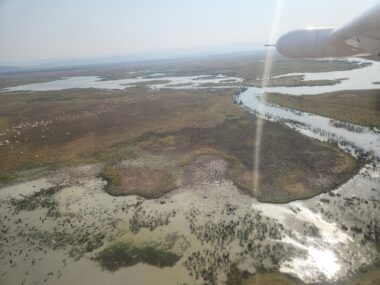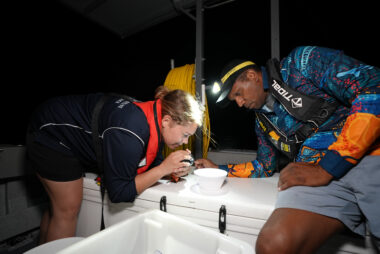15 May 2024
The documentation reveals that:
- 25 macaques died as part of the experimental design
- 1 macaque died from strangulation from an enrichment method
- Additional aspects were conducted without approval from the AEC
- The macaques were held longer (12 or 15 months) than the initial protocol approved due to delays in obtaining required antibodies
- Macaques were immunised with a tuberculosis vaccine without approval from the AEC
- Not all planned components of the project were completed.
There are uncertainties about what was approved versus what happened. Details are missing about the achievement of project objectives. These uncertainties come from claimed FOI Act exemptions, which have resulted in parts of the project report being redacted.
Based on the redacted documentation, it appears to AFSA that the research was not conducted in accordance with AEC approval. It is unclear to AFSA what actions were taken, if any, in relation to the apparent non-compliance, and what the consequences were, if any, of the identified errors for the research group or the AEC.
In AFSA’s view, there are clear ethical dilemmas with using animals who possess high cognitive abilities and well-developed social structures as mere ‘tools for research’, and there are scientific concerns over the validity of using primates in HIV research.
Because HIV and simian immunodeficiency virus (SIV) are closely related viruses, researchers study SIV to learn more about HIV. However, SIV differs from the genetics of HIV by a staggering 50% (2). This is indicative of the failing of 100 different types of HIV vaccines tested in monkeys with positive results, none of which provided protection or therapeutic benefit in humans, due to major differences in SIV-infected macaques compared to HIV-infected humans (3).
In addition to what AFSA considers to be the unnecessary deaths of 26 primates, the released documentation underscores AFSA’s concerns surrounding lax AEC oversight of animal research. AFSA spokesperson Rachel Smith states ‘Whilst it is understood that research projects can be subject to unforeseen delays, when such research involves sentient animals subjected to ongoing confinement, AFSA is gravely concerned that the failings described in the project reporting documentation were by a prominent Australian research group’.
AFSA previously exposed unexpected deaths at a Gippsland primate breeding colony. A current AFSA campaign is highlighting the individual stories of primates used in biomedical research across Australia and calling for an end to taxpayer funded primate research.
ENDS
- Australian code for the care and use of animals for scientific purposes, 2021, available at: https://www.nhmrc.gov.au/about-us/publications/australian-code-care-and-use-animals-scientific-purposes
- Taylor (2016) Monkeys are still suffering for ineffective HIV research https://www.crueltyfreeinternational.org/what-we-do/blog/monkeys-are-still-suffering-ineffective-hiv-research
- Bailey J. Monkey-based research on human disease: the implications of genetic differences. Altern Lab Anim. 2014;42(5):287-317. doi:10.1177/026119291404200504
Additional information:
AFSA notes that the Australian code for the care and use of animals for scientific purposes (1) relevantly provides:
“…
1.32 All activities…that involve the care and use of animals for scientific purposes must:
…
3. be conducted in accordance with AEC approval.
2.3.2 The AEC must:
…
6. take appropriate actions regarding non-compliance
…
2.3.25 When projects or activities that are in breach of the Code are detected, the AEC must ensure that:
1. actions are taken to ensure that animal wellbeing is not compromised, the issue is addressed promptly, and activities that have the potential to adversely affect animal wellbeing cease immediately (see Clauses 5.2 and 5.4). Actions may include suspending or withdrawing approval for the project or activity
2. actions are taken to address the issues in consultation with the person(s) involved
3. when considered necessary, such matters are referred to the institution for action
4. non-compliance receives appropriate follow-up.
…”
FOI2020/38: Document can be requested from CSIRO via their disclosure log.
The Australian Animal Health Laboratory is now known as the Australian Centre for Disease Preparedness (a CSIRO facility).
ENDS
Key Facts:
Key Points
- AFSA secured project documentation relating to project oversight of a research protocol using macaques to investigate viral transmission of HIV conducted by University of Melbourne researchers
- The documentation revealed an accidental death by stangulation, the holding of primates longer than the agreed limit, and immunisation with a TB vaccine without approval from the responsible animal ethics commitee
- An Australian Code specifies that all activities must be conducted in accordance with AEC approval
- It is unknown if there were any consequences for this apparent breach
About us:
ANIMAL-FREE SCIENCE ADVOCACY
Animal-Free Science Advoacy is a not-for-profit organisation advocating scientifically valid animal-free methods of research.
Animal-Free Science Advodacy has produced Media Guidelines for reporting on animal use in medical research.
Contact details:
For Interview Requests:
Rachel Smith
Chief Executive Officer Animal-Free Science Advocacy
0415 227 815


